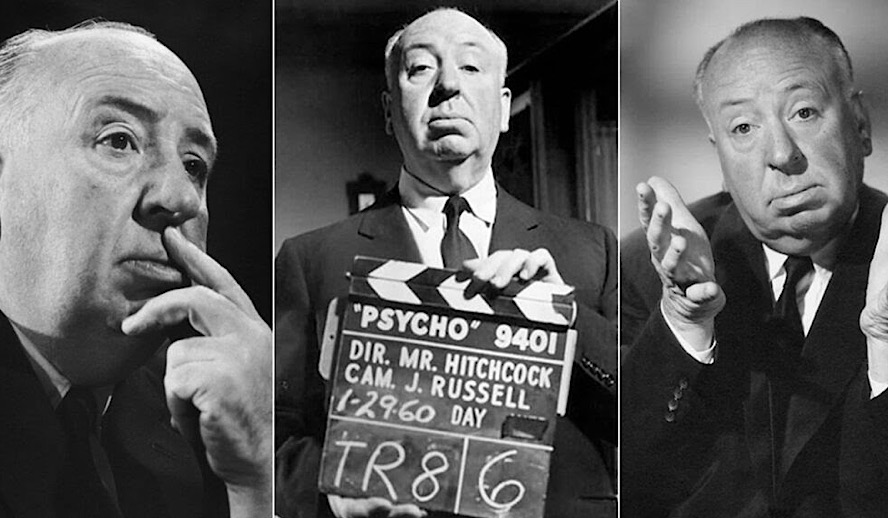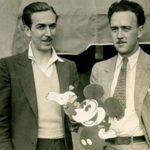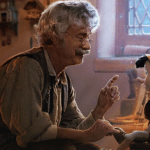Table of Contents

Photo: Alfred Hitchcock
Hitchcock Remakes: Coming soon to theaters, but mostly to Netflix, Ben Wheatley’s new film will attempt to do what few before have dared. Rebecca, starring Armie Hammer and Lily James, is an adaptation of the novel by Daphne Du Maurier, but more intimidatingly, it is a remake of a classic film from director Alfred Hitchcock. Hitchcock’s Rebecca, which starred Laurence Olivier and Joan Fontaine, was the director’s first project after coming to America. It received eleven nominations at the 1941 Academy Awards and is widely considered to be one of Hitchcock’s best.
As a director, Ben Wheatley does not enjoy the prestige held by Hitchcock–few directors ever will–but he has made some audacious films, including the Brie Larson-starring Free Fire and High Rise, starring Tom Hiddleston. Audacity is certainly required to take on the Master of Suspense; here’s a look at how other actors have adapted Hitchcock in the past.
Related article: The Masters of Cinema Archives: Hollywood Insider Pays Tribute to ‘La Vie En Rose’, Exclusive Interview with Director Olivier Dahan
Hitchcock Remakes:
Disturbia, dir. D. J. Caruso, 2007
Disturbia is D. J. Caruso’s remake of Hitchcock’s 1954 masterpiece Rear Window, and it essentially turns the music up to 11 and blasts the glass right out of Hitchcock’s panes. Stepping into the genteel Jimmy Stewart role is Shia LaBeouf, deep in the throes of dangerous adolescence. While Stewart’s character is a housebound voyeur with a broken leg, LaBeouf is under house arrest due to violently attacking his teacher. Both characters spend their days peering out the window, but what they see is quite different.
Related article: FACT-CHECKED Series: Armie Hammer and 32 Facts About Our Mega-Star
Related article: Alfred Hitchcock’s ‘Rope’: A Masterclass in Suspense Cinema from Hollywood’s Golden Age
Hitchcock’s film uses the physical impotence of injury to consider themes of sexual impotence due to aging, but the protagonist of Disturbia is far more concerned with his powerlessness in the face of young adulthood and losing a loved one. What’s perhaps most disturbing is that the windows in both films represent desire. Rear Window shows an array of idle thrills before introducing a bit of mystery, but Disturbia is far more focused on the trouble brewing. The pent-up Shia LaBeouf believes his neighbor (David Morse) is a serial killer, perhaps out to get his mother (Carrie-Anne Moss). From a psychological perspective, is the implication that the young man harbors a secret desire to commit matricide? That might seem a little extreme, but this is a film that starts with a brutal car accident and only escalates from there. That’s one way to differentiate yourself from Hitchcock.
Flightplan, dir. Robert Schwentke, 2005
This Jodie Foster-starring thriller adapts Hitchcock’s 1938 film The Lady Vanishes. It’s another Hitchcock update that takes the approach of pushing everything to the extreme. It switches Hitchcock’s train for a state-of-the-art jumbo jet, and–for maximum histrionics–replaces Hitchcock’s vanished lady spy with the protagonist’s six-year-old daughter. While both films involve a female protagonist searching for the missing person who everyone claims does not exist, Hitchcock’s heroine has a sidekick and a growing number of allies as the film progresses. Schwentke keeps Jodie Foster agonizingly isolated in his film.
Subscribe to Hollywood Insider’s YouTube Channel, by clicking here.
Hitchcock also lets his audience in on the existence of the criminal conspiracy early on, while Schwentke maintains the mystery until the final act. Schwentke does get bonus Hitchcock points for having an onboard psychiatrist psychoanalyze Jodie Foster regarding why she might invent having a living daughter on the plane. He also makes use of Hitchcock’s eye motif when Jodie Foster’s pupils dilate after being told by the pilot (Sean Bean) that her daughter died in Berlin before ever having boarded the plane. It’s worth noting that while Hitchcock’s The Lady Vanishes does not involve a kidnapped child, his 1934 film The Man Who Knew Too Much does. Hitchcock liked that film so much that he remade it himself in 1956. That film, which also stars Jimmy Stewart, might be the absolute best Hitchcock remake of all time.
A Perfect Murder, dir. Andrew Davis, 1998
A remake of Hitchcock’s Dial M for Murder, A Perfect Murder is exactly the kind of sexy, smart thriller Michael Douglas was making constantly throughout the 1990s. The basic story is that a man finds out that his wife is having an affair, and he blackmails a man into killing her. However, his wife gets the upper hand and kills her would-be killer, forcing the man into a cat-and-mouse game in an attempt to extricate himself from the murder charge. In Hitchcock’s film, the husband, the wife’s lover, the blackmailed man, and the primary investigator are all separate entities, but Andrew Davis streamlines the proceedings and allows all of the characters to wear two or more hats. Davis also includes reversals; blackmailers become blackmailees and murder suspects become murder victims.
Related article: The Power of Positivity: Ikorodu Bois + Chris Hemsworth + Russo Brothers + Sam Hargrave
Limited Time Offer – FREE Subscription to Hollywood Insider – Click here to read more on Hollywood Insider’s vision, values and mission statement here – Media has the responsibility to better our world – Hollywood Insider fully focuses on substance and meaningful entertainment, against gossip and scandal, by combining entertainment, education, and philanthropy.
While Hitchcock’s plot has heroine Grace Kelly framed and sidelined for much of the picture, Andrew Davis has the sophisticated United Nations employee Gwyneth Paltrow doing most of the detective work. Hitchcock gives the main heroics of his film to the chief investigator (John Williams), but Davis has an intriguing detective (David Suchet) who doesn’t get much to do. Fortunately, Suchet would go on to solve murder mysteries as Agatha Christie’s beloved Hercule Poirot. Davis also murkies the waters of morality far beyond Hitchcock’s preferences–both the husband and the lover (a slick Viggo Mortensen) are shockingly devious. A final note: fashion icon Grace Kelly is paid tribute to by the signature bag Gwyneth Paltrow carries in the film.
Psycho, dir. Gus Van Sant, 1998
Often derided as a formalist experiment gone awry, Gus Van Sant’s nearly shot-for-shot remake of Psycho is actually quite enjoyable. It’s interesting that Van Sant’s approach to remaking Hitchcock was to literally copy his film, from the score to the script to the camera angles, and merely insert different actors. Oddly, Broadway plays change casts routinely and audiences and critics accept it willingly. Songs get covered as well without much controversy. With films, however, the consensus tends to be that the original is sacred.
Related article: Hollywood Insider’s CEO Pritan Ambroase: “The Importance of Venice Film Festival as the Protector of Cinema” – Cinema Will Survive and Thrive
Related article: Live Updates: List of Successes From Black Lives Matter Protests!
Van Sant does add some interesting flourishes. Dream sequence imagery spliced into the film’s death scenes provides fodder for Hitchcock’s psychoanalytical fans, and Norman Bates’ aviary is lovingly and colorfully constructed. Since so much of the remake is identical to the original, the performances are the main point of contention. Van Sant benefits greatly from a bevy of excellent character actors, including Wiliam H. Macy, James Le Gros, James Remar, Robert Forster, Philip Baker Hall, Rance Howard, Flea, Julianne Moore, and Viggo Mortensen (who apparently spent 1998 looking for Hitchcock remakes to star in).
Among the leads, Vince Vaughn gives a mannered, tic-heavy performance, quite distinct from Anthony Perkins’ more subtle deviousness. Anne Heche’s straightforward interpretation of Marion Crane helps to highlight Van Sant’s examination of artifice. Marion Crane as a character is defined by neurotically flawed deception, so to have Anne Heche’s performance itself be a neurotically flawed interpretation of that provides a meta element that lends itself to Van Sant’s experiment. It’s reminiscent of Plato and Aristotle’s interpretations of art. Plato dismisses art as a superfluous copy of nature, whereas Aristotle acknowledges the cognitive value one receives from viewing art.
Related article: FACT-CHECKED Series: 32 Facts on Hollywood Legend Quentin Tarantino
Related article: Pritan Ambroase On His Idols Martin Scorsese & James Cameron And Positive Actions Needed To Avert Global Warming Crisis
Throw Momma From the Train, dir. Danny DeVito, 1987
This film might be the most successful remake on this list, largely due to it differentiating itself from its source material by being an entirely different genre. Hitchcock’s 1951 Strangers on a Train is a psychological thriller film noir that follows two men involved in a murder plot in which they will get rid of inconvenient people in their lives by swapping murders. Danny DeVito’s film has the same premise but plays it for laughs. While Strangers on a Train considers one of Hitchcock’s favorite subjects–the flexible morality of the upper class–Throw Momma From the Train explores artistic frustration, messy breakups, and overbearing mothers. Perhaps the greatest coup that Danny DeVito pulls is that he has his character go and watch Hitchcock’s Strangers on a Train at the movie theater as inspiration for his murder plot.
Hitchcock’s film deals with the idea of doppelgängers, and in DeVito’s version, the doppelgängers are DeVito and Billy Crystal. Billy Crystal plays a frustrated murder mystery writer dealing with the meteoric literary success of his ex-wife (Kate Mulgrew). Danny DeVito, a student in the fiction writing class Crystal teaches, is the homunculus version of Crystal’s character. Crystal is figuratively dwarfed and emasculated by his ex-wife, and mentally stunted as a result. DeVito is physically dwarfed by his overbearing mother (Anne Ramsey), whose abusive treatment of him keeps him in a childlike state. This being a comedy, DeVito turns the subtext of sexual impotence into text. Crystal develops a regressive sexual fetish for trains, which not only references the original Hitchcock film but also Hitchcock’s fondness for Freudian metaphor. In North By Northwest, Hitchcock implies the sexual union of his two leads by having a train enter a tunnel. Just remember, if Ben Wheatley’s Rebecca has a scene where Armie Hammer takes Lily James to see Alfred Hitchcock’s Rebecca at the local cineplex, Danny DeVito did it first.
Click here to read Hollywood Insider’s CEO Pritan Ambroase’s love letter to Black Lives Matter, in which he tackles more than just police reform, press freedom and more – click here.
An excerpt from the love letter: Hollywood Insider’s CEO/editor-in-chief Pritan Ambroase affirms, “Hollywood Insider fully supports the much-needed Black Lives Matter movement. We are actively, physically and digitally a part of this global movement. We will continue reporting on this major issue of police brutality and legal murders of Black people to hold the system accountable. We will continue reporting on this major issue with kindness and respect to all Black people, as each and every one of them are seen and heard. Just a reminder, that the Black Lives Matter movement is about more than just police brutality and extends into banking, housing, education, medical, infrastructure, etc. We have the space and time for all your stories. We believe in peaceful/non-violent protests and I would like to request the rest of media to focus on 95% of the protests that are peaceful and working effectively with positive changes happening daily. Media has a responsibility to better the world and Hollywood Insider will continue to do so.”
Vote with a conscience – Register to Vote – Your vote saves lives and ends systemic racism
Ways to support Black Lives Matter Movement to end systemic racism
More Interesting Stories From Hollywood Insider
– Want GUARANTEED SUCCESS? Remove these ten words from your vocabulary| Transform your life INSTANTLY
– Compilation: All James Bond 007 Opening Sequences From 1962 Sean Connery to Daniel Craig
– Do you know the hidden messages in ‘Call Me By Your Name’? Find out behind the scenes facts in the full commentary and In-depth analysis of the cinematic masterpiece
– A Tribute To The Academy Awards: All Best Actor/Actress Speeches From The Beginning Of Oscars 1929-2019 | From Rami Malek, Leonardo DiCaprio To Denzel Washington, Halle Berry & Beyond | From Olivia Colman, Meryl Streep To Bette Davis & Beyond
– In the 32nd Year Of His Career, Keanu Reeves’ Face Continues To Reign After Launching Movies Earning Over $4.3 Billion In Total – “John Wick”, “Toy Story 4”, “Matrix”, And Many More
Hitchcock remakes, Hitchcock remakes, Hitchcock remakes, Hitchcock remakes, Hitchcock remakes, Hitchcock remakes, Hitchcock remakes, Hitchcock remakes, Hitchcock remakes, Hitchcock remakes, Hitchcock remakes, Hitchcock remakes, Hitchcock remakes, Hitchcock remakes, Hitchcock remakes, Hitchcock remakes, Hitchcock remakes, Hitchcock remakes, Hitchcock remakes, Hitchcock remakes, Hitchcock remakes, Hitchcock remakes, Hitchcock remakes, Hitchcock remakes, Hitchcock remakes, Hitchcock remakes, Hitchcock remakes, Hitchcock remakes, Hitchcock remakes, Hitchcock remakes, Hitchcock remakes, Hitchcock remakes, Hitchcock remakes, Hitchcock remakes, Hitchcock remakes, Hitchcock remakes









